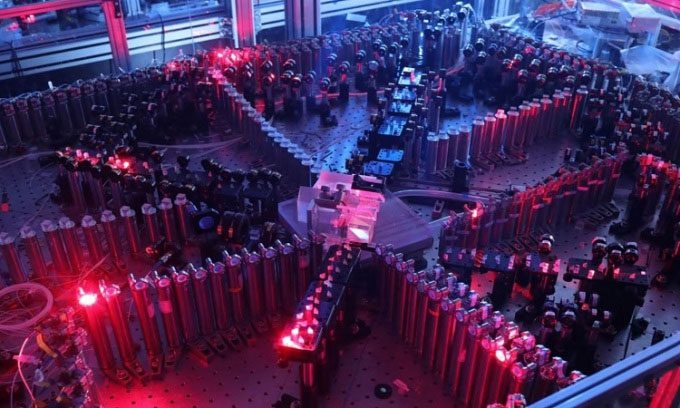The research team stated that this device could be applied to data mining, biological information, network analysis, and chemical modeling research.
According to the South China Morning Post (SCMP), a group of Chinese scientists announced that they have achieved another significant milestone in quantum computing, claiming that their Jiuzhang device can handle tasks related to artificial intelligence (AI) 180 million times faster than the world’s most powerful supercomputer.

In their research utilizing quantum computing, the scientists implemented and accelerated two algorithms – random search and metallurgical simulation – used in the field of AI. (Photo: University of Science and Technology of China).
The problems solved by the Chinese quantum computer can be applied to data mining, biological information, network analysis, and chemical modeling research.
Specifically, in an article published in the journal Physical Review Letters in May, the research team led by Pan Jianwei, a physicist at the University of Science and Technology of China, who is dubbed the “father of technology science” in China, wrote: “Our work aims to experiment with solving real-world problems that traditional supercomputers struggle to handle.”
In experimental trials, the research team used the Jiuzhang device to solve a problem that was challenging for traditional computers. Jiuzhang utilized over 200,000 samples to address the issue. Typically, the fastest supercomputer in the world would take 700 seconds to generate each sample, meaning it would take nearly 5 years to process over 200,000 samples. However, for Jiuzhang, the processing speed is less than 1 second.
Because the fundamental information of quantum computers can simultaneously represent all possibilities, they are theoretically much faster and more powerful than the conventional computers used in everyday life.
However, the drawback of quantum computing technology is that the subatomic particles in the core are extremely fragile, existing for a short time and easily disrupted by a slight disturbance in the surrounding environment. Most quantum computers operate in extremely cold and isolated environments to avoid interruption.
Jiuzhang, named after a 2,000-year-old mathematical text from China, uses light as a physical medium for computation. Unlike other quantum computers, Jiuzhang does not need to operate separately at extremely low temperatures and can function stably for longer periods.


















































